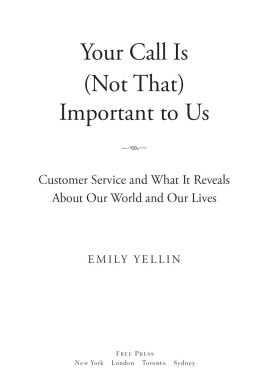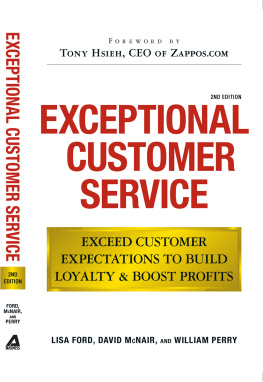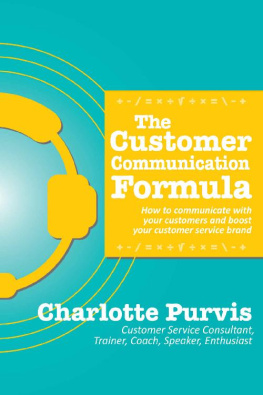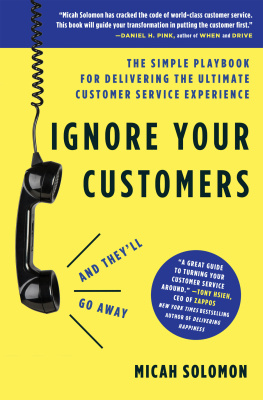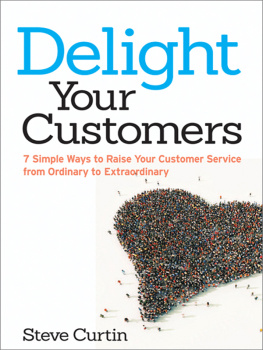Also by Emily Yellin
Our Mothers War

Free Press
A Division of Simon & Schuster, Inc.
1230 Avenue of the Americas
New York, NY 10020
Copyright 2009 by Emily Yellin
All rights reserved, including the right to reproduce this book or portions thereof in any form whatsoever. For information address
Free Press Subsidiary Rights Department,
1230 Avenue of the Americas, New York, NY 10020
FREE PRESS and colophon are trademarks of Simon & Schuster, Inc.
The Simon & Schuster Speakers Bureau can bring authors to your live event. For more information or to book an event contact the Simon & Schuster Speakers Bureau at 866-248-3049 or visit our website at www.simonspeakers.com
Library of Congress Cataloging-in-Publication Data
Yellin, Emily.
Your call is (not that) important to us: customer service and what it reveals about our world and our lives / by Emily Yellin.
p. cm.
1. Customer services. 2. Customer relations. 3. Corporations
Public relations. I. Title.
HF5415.5.Y47 2009
658.812dc22 2009002468
ISBN-13: 978-1-4165-9457-4
ISBN-10: 1-4165-9457-4
Visit us on the World Wide Web:
http://www.SimonSays.com
Dedicated to
Chuck, Peyto, and Ezra
Authors Note
In the course of writing this book Ive learned that customer service is all about expectations. So, in an attempt to provide readers with good customer service, I feel the need to clarify what this book is and isnt meant to be.
The majority of sources in this book are original. However, I did turn to other peoples reporting about certain incidents that happened before my work began or for which I was not present and original sources were not available. For any detailed descriptions of such incidents, I consulted more than one trusted account. All of those sources are credited in the narrative itself or in notes at the end of the book. Anything else is my own reporting. And although the customer service industry is in constant flux, I did my best to include the most timely information possible.
To get an up-close look at outsourced foreign call centers, I could have traveled to just about anywhere in the world, since they are that widespread. But I chose to focus my on-the-ground reporting in two emerging outsourcing localesLatin America and Africarather than in the more established locales of India and the Philippines, which have been much reported on by others.
This book is not intended as a comprehensive analysis of the industrys problems or as a prescription for its future improvement. Instead, it is an attempt to seek out the humanity and reason behind the customer service experiences that many people find to be inhuman and nonsensical. My efforts were grounded in the idea that is important for those of us who are customers (and everyone is somebodys customer) to know more about the inner workings of global customer service and its ever-increasing impact on us all as we try to navigate successfully through our daily lives.
As the twenty-first century dawned, most people were feeling fed up. A public opinion poll in 2001 reported that 80 percent of Americans believed the constant coarseness, disrespect, and lack of consideration they encountered in society was such a serious, pervasive problem that it affected them on a personal, gut level and had grown into a daily assault on their sensibilities and the quality of their lives. At the same time, it seemed people didnt believe they had much power to change things, so they simply resigned themselves to all the insidious incivility they encountered.
The Pew Charitable Trusts sponsored the poll, called Aggravating Circumstances: A Status Report on Rudeness in America. Public Agenda, a national policy research group, conducted it. And in their introduction, the authors made sure to justify their examination of how we get along with each other in public every day: At first, it might seem that conducting a survey on courtesy and rudeness is less serious or important than exploring citizens views on, say, health care or education or retirement policy. Yet how people treat each other in their daily interactionswhether they take steps to be respectful of one another, whether they are willing to moderate their own desires and comfort to accommodate the needs of othersseems to us to be profoundly important and indeed central to the definition of a civilized society.
The report immediately zeroed in on one area of society that most respondents agreed offers perhaps the ripest examples of rude and infuriating public behavior. Americans say that the way they are treated by business and customer service employees is frequently exasperating, and sometimes even insulting. One particular customer service channel came under the heaviest fire. When it goes wrong, perhaps nothing embodies greater exasperation than customer service by phone.
According to the survey, 67 percent of Americans sometimes have to make a fuss to get a problem resolved. And nearly everyone94 percentfinds it very frustrating to call a company and get a recording instead of a human being. And even if callers do finally speak to a live customer service agent, the irritation doesnt always end. In a Florida focus group, one man said, Half the time they have no idea what theyre talking about. And they dont care. Theyll tell you anything just to get you off the phone.
To be fair, the report also notes that it seems the rudeness cuts both ways. Disgruntled customers bring frayed nerves, previous frustrations and their own personal shortcomings when they deal with those responsible for helping them. A Connecticut customer service representative told her focus group, They think youre at their beck and call. They may want something, and theyre not getting it as rapidly as they think they should. I answer the phone, and they just immediately go off on me.
It probably doesnt take a scientifically conducted public opinion poll to find evidence of the contempt most Americans harbor toward bad customer service or to elicit testimony about the effects of that kind of antipathy in their lives. Merely bringing up the subject at any gathering will generate at least one horror story from just about everyone. But in the years since that survey officially highlighted and validated the displeasure bubbling just under the surface of our everyday dealings with customer service, a few of those tensions have boiled over in very public ways. The news media, in tandem with various Web sites, have played increasingly larger roles in amplifying them. Just ask Comcast, for example.
Trouble for the nations largest cable television and broadband provider started in earnest with the story of LaChania Govan, a mother of two in her mid-twenties who inadvertently became a public symbol of mistreated customers everywhere. Govan lives in suburban Chicago. She goes to work all week and attends church every Sunday. She has a pleasant and welcoming voice. She also has a strong sense of fairness.
In July 2005, Govans digital video recorder wouldnt work. She called Comcasts customer service line in Chicago but couldnt get through. During the course of four weeks, she called more than forty times. She was repeatedly disconnected, put on hold, or transferred to inept or inert representatives and technicians. One customer service representative transferred her to the Spanish-speaking line. Govan knows only English. She just wanted someone to resolve her seemingly simple case.
She says she never raised her voice, but she was resolute. Calling Comcast became my second job, Govan said. I had to ensure the cordless phone was fully charged and the kids were content. And I sat and called. I cooked and called. I cleaned and called, and just called. Almost every day, Govan prodded the big companys customer service department as best she could. Finally, she found a rep who heard her out and took her case in hand. A technician was sent to replace her cable box at no charge, and she was credited with a free month of service. Govans perseverance paid off. Her headaches seemed to be over.

